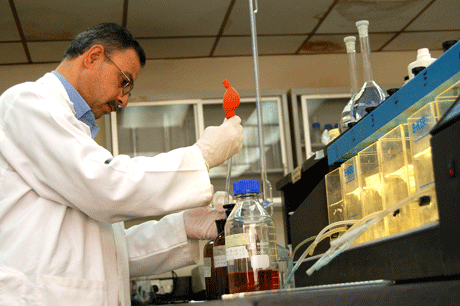The Oregon Clinical and Translational Research Institute (OCTRI) received $40 million from the federal government to continue supporting laboratory and medical research at OHSU and other Oregon institutions.
“This award is an essential component of OHSU’s research portfolio,” said OHSU Dean, Mark Richardson. “It’s a testament to the successes of OCTRI’s first funding cycle and it allows us to continue our efforts to achieve added excellence in clinical and translational research.”
NIH Funding to Stimulate Laboratory and Medical Research
In 2006, OHSU was one of the first 12 institutions to receive a Clinical and Translational Science Award from the National Center for Research Resources (NCRR). This federal funding was envisioned as a way to stimulate laboratory and medical research, with the goal of producing tangible results more quickly.
“These institutes were the pioneers in this program and are to be commended for the work they have done in bridging the traditional divides between laboratory research and medical practice,” said NCRR Director Barbara Alving, MD. “They were tasked with transforming the way their institutions coordinate research to make it more proactive and effective in producing real-world results, and in the process, they have served as innovative models nationwide.”
After applying for additional funding, OCTRI and nine of the other original universities and medical centers (see list below) received an extension of the five-year award. In spite of the obvious benefits to OHSU, the award is not without challenges.
Budget Cuts Create Challenges for Medical Research Support
 Due to previously planned reductions in support from NCRR, the OCTRI budget for the next five years will be 30 percent less than it was during the first funding cycle. In response, OCTRI has adapted by focusing its limited resources on high-impact laboratory and medical research areas.
Due to previously planned reductions in support from NCRR, the OCTRI budget for the next five years will be 30 percent less than it was during the first funding cycle. In response, OCTRI has adapted by focusing its limited resources on high-impact laboratory and medical research areas.
“We haven’t lost sight of the fact that this is a multi-million dollar award dedicated to catalyzing and supporting clinical and translational research,” said Eric Orwoll, MD, OCTRI Director and Associate Dean for Clinical Science.
“We are looking very carefully at our services and programs to determine which have the greatest impact on the success of OHSU’s researchers. The reality is that we simply can’t offer the same broad range of services. We will continue to make a difference in high priority areas. ”
In order to maximize the impact of the funding for laboratory and medical research, the OCTRI leadership worked closely with the OHSU School of Medicine, Vice President of Research and Collaborative Research Leadership Group. This included aligning OCTRI’s focus with that of the OHSU Research Roadmap’s strategic initiatives.
High Priority Areas
Highlights of OCTRI’s focus for the next five years include:
Continued funding of pilot projects in translational research. In its first five years, OCTRI provided $3 million in pilot project funding to over 80 laboratory and medical research projects. This included partnering with the OHSU Primate Center, Pacific Northwest National Laboratories, OTRADI and OHSU’s Technology Transfer & Business Development Office. These collaborations enabled OCTRI to pool funding, streamline the application process and spark collaborations that matched the unique strengths of the partner institutions. Several pilot projects funded by OCTRI have already resulted in additional grant funding.
Continued services for inpatient and outpatient studies. In order to maintain study coordinator and nursing services, the OCTRI Clinical and Translational Research Center (CTRC) unit vacated office and clinical research space in the OHSU Center for Health & Healing. In addition, with input from investigators, the Core Laboratory and Bionutrition Unit (both part of the CTRC) eliminated underutilized services.
Collection and analysis of biological specimens through the OCTRI partnership with Kaiser Permanente. This effort builds on the unique ability of the Kaiser Permanente Center for Health Research to store tissue samples long-term for research purposes. OCTRI organized opportunities for OHSU investigators to provide input into the specimen-collection efforts. These collaborations will lay the foundation for additional grant funding.
Biostatistical support for early-career investigators applying for or implementing career development awards. Previously, OCTRI provided pre-award biostatistical support for researchers across OHSU. Because it is no longer feasible for OCTRI to offer this type of broad support. OCTRI will focus instead on helping early-career faculty establish independent research careers. This effort builds on an existing strength within OCTRI and aligns with an objective highlighted in the School of Medicine Research Roadmap.
National Context
This year’s CTSA five-year renewal funding, by institution, is as follows:
- UCSF ($112.0 million)
- University of Pittsburgh ($67.3 million)
- Mayo Clinic ($62.8 million)
- University of Pennsylvania ($54.8 million)
- Yale University ($45.4 million)
- Oregon Health & Science University ($39.8 million)
- Columbia University Health Sciences ($38.9 million)
- Rockefeller University ($36.1 million)
- University of Rochester ($20.7 million)
- UC Davis ($20.0 million)


